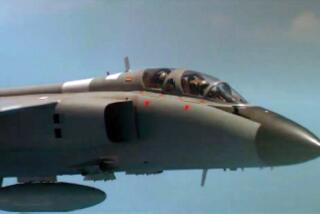U.S., China Are to Take Major Step Toward Resuming Ties With Visit
WASHINGTON — The United States and China will resume high-level military contacts later this month, the Pentagon said Wednesday, marking one of the final steps toward a resumption of formal contacts broken after the U.S. bombing of Beijing’s embassy in Yugoslavia last May.
While the planned visit of Chinese army Lt. Gen. Xiong Guangkai to Washington from Jan. 24 to 26 is likely to yield few substantive results, it is viewed as a sign that the effects of one of the most disruptive Sino-American incidents in recent years are fading.
“It shows the wheels are beginning to roll again now,” said a Pentagon official who declined to be identified. “We don’t have an agenda yet, but it is likely to be very routine.”
China specialists outside the Clinton administration viewed the development as a sign that political moderates in Beijing and Washington are gaining greater influence in the volatile relationship.
Alan Wachman, who follows U.S.-Chinese relations at the Fletcher School of Law and Diplomacy at Tufts University in Medford, Mass., said Xiong’s planned visit shows that both governments have managed to assert themselves over powerful and vocal opponents of the relationship.
“The symbolic value of this is that the proponents of reason on both sides, at least at this moment, are able to get their hands on the steering wheel,” Wachman said.
Military contacts between Washington and Beijing were severed after a Stealth bomber operating as part of the North Atlantic Treaty Organization-led air campaign against Yugoslavia attacked the Chinese Embassy in Belgrade, apparently in error. Three Chinese nationals were killed and 27 others injured in the attack on the Belgrade mission, which triggered a wave of anti-American demonstrations in Beijing.
Xiong, who carries the title of deputy chief of staff of the People’s Liberation Army, serves as a kind of de facto foreign minister for the Chinese military, specializing in politically oriented military issues. He has visited the United States several times since the U.S. normalized ties with Beijing in 1979, and he is expected to meet with Undersecretary of Defense Walter Slocombe.
In an attempt to relaunch the dialogue, Deputy Assistant Secretary of Defense Kurt Campbell traveled to China last month. That visit followed a conciliatory gesture by Beijing, which permitted the U.S. Navy destroyer O’Brien to stop in Hong Kong.
The U.S.-Chinese military contacts have served as a mutual confidence-building measure and as a vehicle to boost understanding in both capitals of military thinking. U.S. advocates of the contacts claim they act as a not-so-subtle deterrent, giving the Chinese a sobering view of America’s military might and underscoring just how much more advanced in technology the United States really is.
Critics complain that Chinese military officials get to see far more than the uniformed Americans who visit China. Some conservatives see Chinese visits to the United States as little more than an opportunity for espionage. There are no military sales between the two countries.
Xiong also oversees military intelligence and is best remembered in the United States as the PLA officer who reportedly warned in the fall of 1995 that the United States could no longer intimidate China because Beijing’s nuclear arsenal had the capability to reach Los Angeles.
His visit also follows an agreement late last year in which the administration agreed to pay China $28 million in compensation for its damaged embassy in Belgrade, while, for its part, Beijing agreed to pay the United States $2.8 million for repairs to American diplomatic facilities in China after they were attacked by mobs protesting the bombing.
More to Read
Sign up for Essential California
The most important California stories and recommendations in your inbox every morning.
You may occasionally receive promotional content from the Los Angeles Times.










